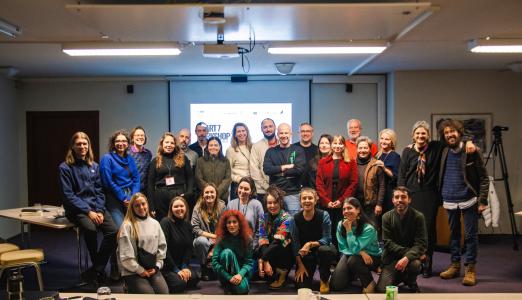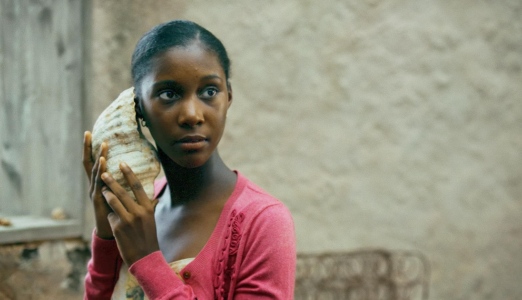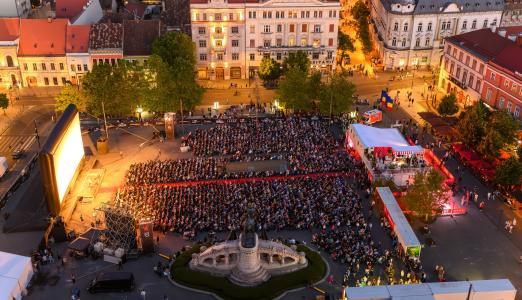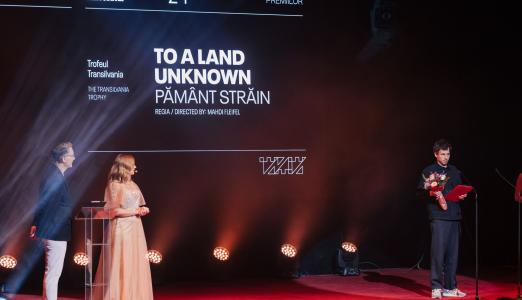Tudor Giurgiu: Enjoy TIFF!
Tudor Giurgiu, President of Transilvania International Film Festival, reflects on the last 12 months and the surprises reserved for this edition.
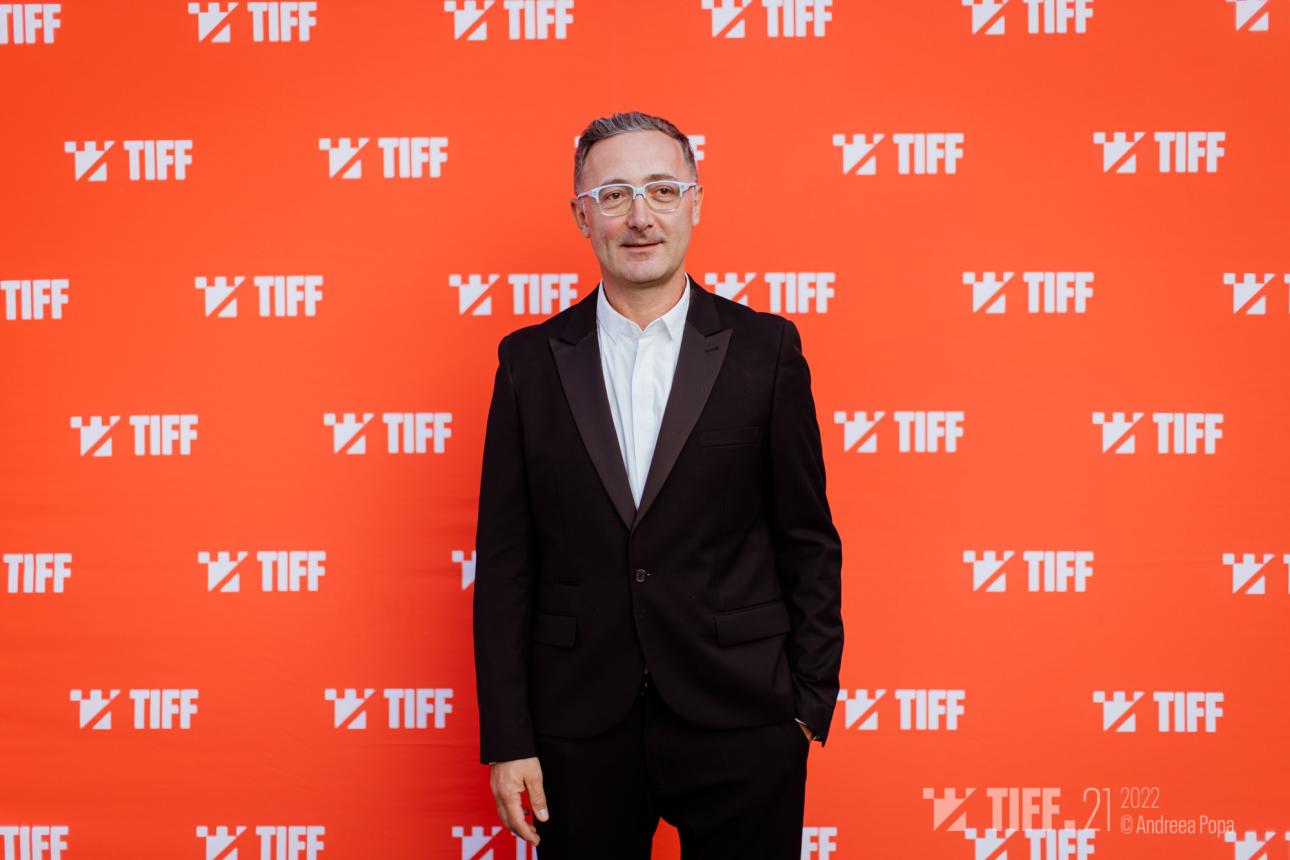
I don't know what happens to others when they turn 50, but for me all the months between June 2022 and today have been an emotional and intense rollercoaster. It was probably one of the best years I've ever had. I finished editing Sibiu 89 which in the meantime became Freedom. I filmed for Nasty, the documentary about the life and career of Ilie Nastase, legendary tennis player, the first world number 1 in tennis history (1973). Recently, together with colleagues Tudor and Cristi, we declared picture lock.
It was very difficult for me to work on a period film, to go back in time to 1989, to find locations that kept the touch of those years. I watched dozens of clips and VHS footage, saw hundreds of photographs. I barged into the souls and lives of people who no longer wanted to remember what happened in Sibiu in December 89. I cried with them, I let all their energy and their anger - that time has passed and nobody has done them justice - steep into me. I went all over the country trying to find former soldiers and militiamen involved in the incidents of those days. People I didn't know wrote to me, reliving nightmarish moments: they were students at the military school in Sibiu and they were shooting terrified, in all directions, chaotically. They killed each other. Terrorists were nowhere and everywhere. Anyone could have been one. A neighbour, a work colleague, a close relative, an Oltcit driver breaking through the barricade of patriotic forces. I spent months casting, trying to assemble a team of actors who would work well together. I was like a Jurgen Klopp who needed players with sparkle, but also an ensemble that would work like a clock. I found them. Lots of them and truly excellent ones. When we were filming in Brăila, the war in Ukraine started. Our film became somewhat of a background story, during the breaks our colleagues were involved in the process of helping and hosting refugees. During the shoot, I could only sleep 4-5 hours a night. I blamed it on the hard mattress on the hotel bed, but actually it was the adrenaline. The thought of arriving on set the next day, the thought that I simply had to know how to work with 30 actors and 150 extras. I slalomed through the waves of Covid, patiently listened to stories that didn't interest me, I was both psychologist and therapist, and I befriended dozens of people. I met Alex Calangiu, a wonder of an actor. For post-production I went to Budapest - I turned the film inside out again and again until I reached the most terrible moment for a director, the moment when you say PERIOD. You say "That's it, that's the final film, I'm not touching it anymore!" Freedom will have its world premiere at TIFF this year and it's going to be what I wanted it to be, a screening where I'll be holding my breath together with thousands of people. It's the film I'm most attached to and, I think, my best film so far.
Working in parallel on a documentary film about a character as complex and controversial as Năstase was often the breath of fresh air I needed to balance myself. I was coming out of a story about lies, chaos and manipulation and gradually entering a world I didn't know much about. The tennis of the 1970s (in fact anything related to sport then) has nothing to do with what it is today. The players were friends, they went out for pizza and drinks, money didn't make a difference because they didn't earn that much anyway. They gave each other nicknames without being suspected of being politically incorrect - Năstase called Ashe Negroni, Ilie was either Gypsy or Commie, Solomon and Dibbs were The Jew Boys. People were flocking to see Connors and Năstase in the arenas, tennis was becoming cool and popular and everyone wanted to be there to experience it. They knew what they were getting was not just quality tennis, but also entertainment. Ilie soon became the first rock star in tennis history. How could you not make a film about such a character? Controversial, involved in all sorts of unfortunate stories in recent years, but a generous, big-hearted guy, a poet. As Cristian Tudor Popescu put it, Ilie, even when he was losing, he would say: It's just a game! I've filmed with Rafa Nadal, Stan Smith, Jimmy Connors, Leconte, Boris Becker, Wilander, Billie Jean King and many others. I visited Phil Knight, the co-founder of Nike, at his house. I was flying across the ocean thinking about my militiamen in Freedom and how I was going to finish the film, or how I was going to make Connors spill the beans about the crazy tricks he used to pull with Năstase, or the meetings with A-class actors I was going to invite to TIFF.
Speaking of which, in case you haven't caught on, this crazy year has also seen many conversations (with Chiri, Cristi and Oana) peppered with gin and tonics galore. Conversations about what TIFF, now at its 22nd edition, would be like. But it never crossed my mind that we would end up showing 200 films, that Geoffrey Rush, Oliver Stone and Michel Franco would come to Cluj, all at the same edition. That we would have new screening venues, that there would be unforgettable cine-concerts, that we would be screening films by Godard and Lumet.
I don't really know how this year has gone, but I seriously wonder if I haven’t been touched by the magic of an invisible Puck who made it all seem so simple and natural. It felt like a midsummer’s night, dancing through images and memories with many dear friends.
Enjoy TIFF, I can't wait to show you Nasty next year!
Tudor Giurgiu


